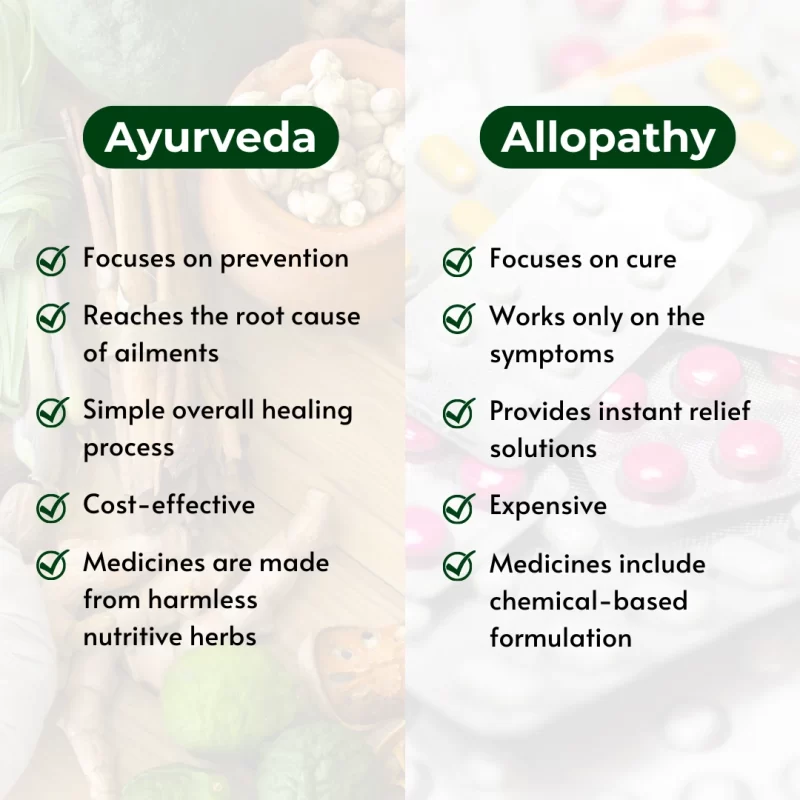Table of content:
- Introduction
- Ayurveda
- Ayurvedic Treatment
- Allopathy
- Allopathic Treatment
- So, which one to choose?
- Experience the Ayurvedic Healing
- Conclusion
Introduction
Ever wondered why our grandparents and parents were stronger and more immune to frequent illnesses?
The answer lies in the fact that they ate organic and healthy food, and their daily routine demanded rigorous physical and mental exercise and movements.
Today, most of us live a lifestyle that includes eating junk, adulterated food, doing little or no exercise, excessive screen time, and long sitting hours. This leads to our deteriorating physical, mental and emotional health.
So, the question arises- Which treatment should we rely on to treat these modern-day diseases?
Let’s first understand the two concepts – Allopathy and Ayurveda
Ayurveda
Ayurveda originated in India over 3,000 years ago. It is an all-natural medical system. The name “Ayurveda” is a constitution of two Sanskrit words- Ayur (life) and Veda (science or knowledge), therefore, Ayurveda means “knowledge of life”.
Ayurveda believes in the theory that diseases in a person are the results of the imbalance in their body constitution or Doshas (Vata/Pitta/Kapha). Based on this, Ayurveda recommends specific lifestyle changes and natural remedies to restore harmony between the body, mind, spirit and environment.
Ayurvedic Treatment
Ayurvedic medicine is primarily based on the ideas of global interconnectivity, bodily constitution (Prakriti), and life forces (doshas). Treatment’s objectives help the patient by getting rid of pollutants, relieving symptoms, boosting immunity, lowering anxiety, and fostering more harmony in their lives. Ayurvedic medicine makes considerable use of herbs and other plants, including oils and common spices.
Allopathy
The Greek words “allos” (which means “opposite”) and “pathos” (which means “to suffer”) are the origin of the word “allopathic.”
German physician Samuel Hahnemann first used this term in the 1800s. It broadly refers to the practice of treating a condition with its opposite, which is common in conventional medicine.
Allopathic medicine focuses on a patient’s symptoms and signs before the treatment and relies on clinical tests and screening to confirm a diagnosis.
Allopathic Treatment
Allopathy is another name for allopathic medicine. It is a healthcare system where pharmacists, nurses, doctors, and other healthcare workers are authorized to practice and treat illnesses and symptoms. Treatments usually include – medication, surgery, radiation, and other therapies and procedures.
So, which one to choose?

Prevention is better than cure.
To provide overall wellness, the Ayurvedic way of living emphasizes disease prevention.
On the other hand, Allopathy follows Hypothesis, Experimentation, Observation, and Conclusion.
Individualization is not considered when administering medication in allopathy. The same medications will be used to treat patients with the same illness. While in Ayurveda, the treatment is tailored to the patient’s unique body constitution (Vata, Pitta, and Kapha) and is treated as per their needs.
This long-standing debate of whether to choose Allopathy or Ayurveda for treatment leaves no room for people to consider that both treatments can be beneficial.
While Allopathy is saving the lives of millions around the world,
Ayurveda is teaching people how to build a natural shield against illnesses by living an overall healthy lifestyle.
Allopathy is reliable when you want to get rid of the symptoms and treat an illness immediately.
But If you want to get to the root cause of an illness, eliminate it completely, and strengthen your body to resist that illness from developing again, then Ayurveda is the solution.
In contrast to allopathy, which focuses solely on treating symptoms, Ayurveda takes a comprehensive approach to healing that ensures the ailment is treated from the core.
Experience the Ayurvedic Healing
Did you know?
Ayurveda can not only help you treat the existing illnesses in your body, but it will also inform you about the illnesses developing in your body which are not showing any symptoms yet and the potential diseases that could occur in the future.
How?
With Nadi Pariksha.
Nadi Pariksha is an ancient ayurvedic pulse diagnosis technique that accurately diagnoses present or potential diseases in one’s body.
The ayurvedic doctors analyze your pulse movements, understand your body constitution (Vatta/Pitta/Kapha) and provide effective treatment based on the diagnosis.
These effective medications are 100% herbal, have almost no side effects, and the suggested lifestyle changes help you attain and retain your health goals.
Conclusion
It is not possible to compare Ayurveda with Allopathy to determine which is more effective because they are two separate medical systems.
Allopathy uses medication to treat the symptoms of the illness. Ayurveda is a holistic wellness treatment method.
Despite their differences, they both are individually significant and reliable treatment practices.
Organize a Nadi Pariksha Camp
Prakritik Lifestyles is currently organizing Nadi Pariksha health camps for various corporate houses and societies across Pune.
Organize a Nadi Pariksha camp at your premises for your employees or society members with us, and give people around you an effective way to manage their health naturally.
Contact us to know more –
https://prakritiklifestyles.com/nadi-pariksha/
contact@plifestyles.com


That’s really nice to know